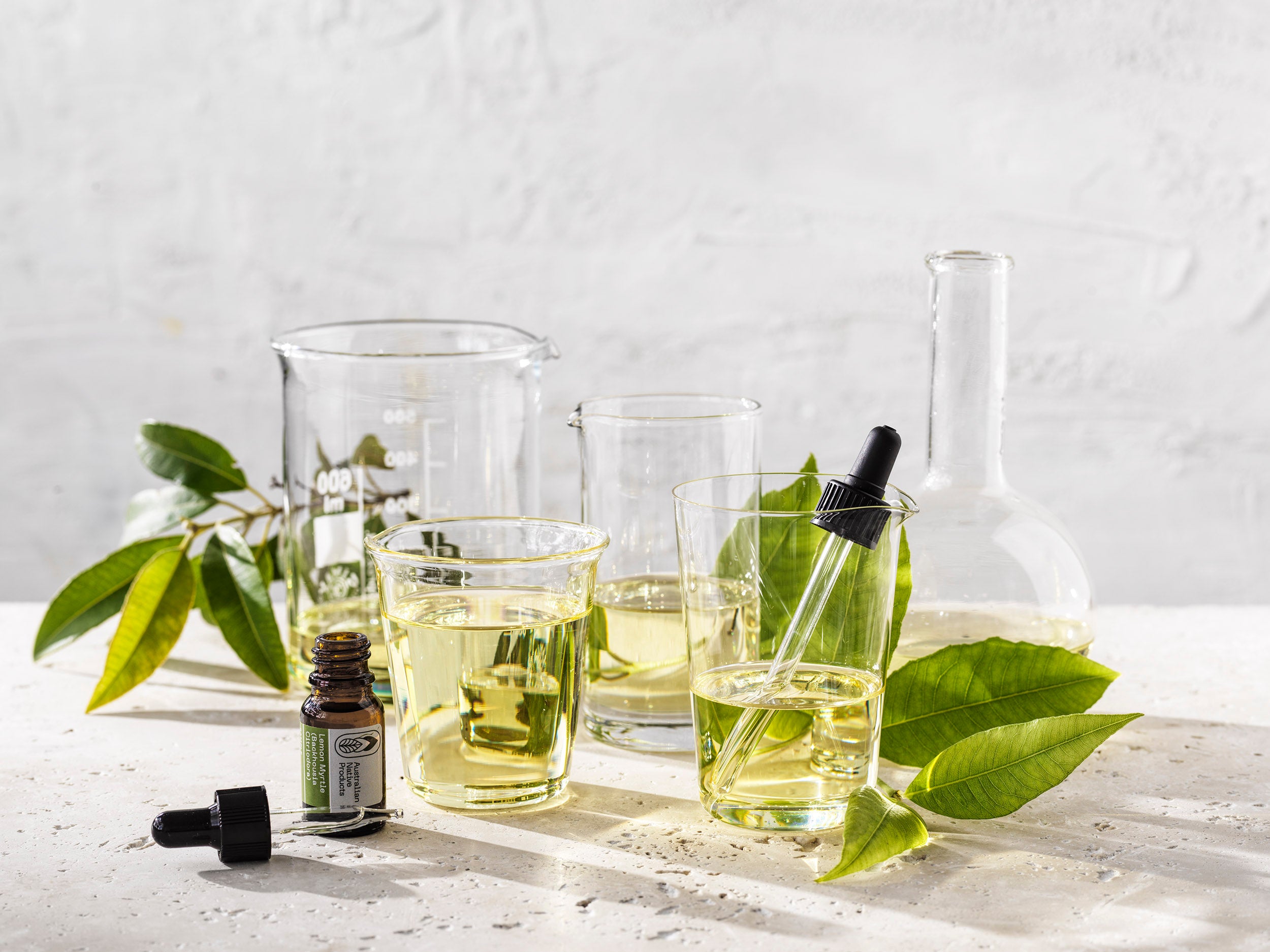Lemon Myrtle Aromatherapy Benefits: An Aussie Revelation
If you've ever strolled through the bush in Northern NSW or the lush rainforests of far north Queensland, you may have noticed the scent of lemon myrtle teasing your senses. Now you can get to experience mother nature's own aromatherapy session and feel a similar sense of calm wash over you without having to leave the comfort of your home.
Lemon Myrtle is a versatile gem from Down Under with amazing benefits for body and soul alike. Not only does its oil have calming properties that ease stress and anxiety, but it also carries antiseptic qualities useful for cleaning!
Hopefully by the time you finish reading this, you'll be eager to incorporate some Lemon Myrtle essential oil blends into your everyday routine. So relax, grab a hot drink - let's jump right in.
Table Of Contents:
- Unveiling the Aromatherapy Benefits of Lemon Myrtle
- The Richness of Lemon Myrtle in Daily Life
- Blending Magic with Lemon Myrtle Essential Oil
- The Antimicrobial Power of Lemon Myrtle
- Embracing Lemon Myrtle in Aromatherapy Practice
- Understanding the Essence of Lemon Myrtle Essential Oil
- Lemon Myrtle vs. Other Essential Oils
- FAQs in Relation to Lemon Myrtle Aromatherapy Benefits
- Conclusion
Unveiling the Aromatherapy Benefits of Lemon Myrtle
The aromatic world holds a secret gem, Lemon Myrtle essential oil. Recognised for its calming effects and fragrant aroma, Lemon Myrtle essential oil is a much-loved component of aromatherapy. But what makes this Australian native so special?
Let’s start with its strong lemon aroma that surpasses even actual lemons. The potent scent is all thanks to its high citral content. With the highest citral purity among essential oils, Lemon Myrtle offers an uplifting and invigorating experience.
This lemony aroma has therapeutic benefits too. When diffused or used in massage blends, it can help calm nerves and reduce stress - making it perfect for those seeking relaxation after a long day.
A Powerful Ally During Flu Season
Beyond just smelling great, there's more to this bush medicine than meets the nose. Indigenous Australians have used Backhousia Citriodora (the scientific name for Lemon Myrtle) as traditional medicine for thousands of years, thanks to the amazing antimicrobial and antibacterial benefits.
Come flu season; you'll want to have your bottle of Lemon Myrtle handy. This mighty oil not only helps clear sinuses but also aids in fighting off colds due to its antibacterial antifungal properties.

Your Cleaning Companion
With such a beautiful aroma, you may be surprised how well cleaning products pair up with our citrus-scented friend. Not only does it make for an effective homemade cleaner - it creates one that smells divine.
Lemon Myrtle is not just an Australian treasure; its aromatherapy benefits are far reaching,
Discover the wonders of Lemon Myrtle essential oil. Not only does its potent, lemony aroma uplift and invigorate, but it also calms nerves and reduces stress. Its antimicrobial properties make it a handy ally during flu season, while its refreshing scent can spruce up homemade cleaners. Truly an Aussie gem with worldwide appeal.
The Richness of Lemon Myrtle in Daily Life
Lemon myrtle, a gem from the Australian native flora, is not just known for its fresh lemon scent and refreshing aroma. Its versatility extends beyond aromatics to become an integral part of our daily life.
Culinary Adventures with Lemon Myrtle
From lending a citrusy tang to culinary delights to being used as an aromatic infusion in beverages, lemon myrtle uses are varied. The indigenous Australians were first to discover this bush medicine's amazing benefits. Since then, it has gained popularity worldwide because of its strong lemon flavour that enhances food and drinks alike.
If you've ever wondered what gives your favourite cocktail or gourmet sauce that unique zesty twist – it could very well be the high citral content found within this sweet verbena family member. It's no surprise then why cooking with lemon myrtle has taken off around the globe.
Cleanliness Meets Natural Fragrance
Beyond the kitchen, let’s not forget how vital cleanliness is - especially during flu season. When we think about cleaning products - they often come with harsh chemical smells. This is where our scented products shine.
Lemon myrtle essential oil (backhousia citriodora), thanks to its antibacterial, antimicrobial and antifungal properties, along with the highest citral purity among all natural sources, makes for an excellent addition into household cleaners. There’s nothing quite like walking into a room cleaned using eco-friendly solutions.
Not just limited to surface cleaners, lemon myrtle has also found its way into personal care products. Whether it's your hand soap or shampoo - the antimicrobial properties of this Australian native work wonders in maintaining hygiene while leaving behind a pleasant lemongrass-like aroma.
To summarise, from tickling our taste buds with its fresh citrus flavour to helping us maintain cleanliness, there's no denying that lemon myrtle is indeed an unsung hero.
From jazzing up our meals with its unique zesty tang to keeping our homes clean and fresh, lemon myrtle does it all. This Aussie native plant isn't just a pretty scent. It's an unsung hero in the kitchen, the cleaning cupboard and even your bathroom, thanks to its potent antimicrobial properties.
Blending Magic with Lemon Myrtle Essential Oil
The refreshing aroma of lemon myrtle essential oil is undeniably invigorating, but it also shines when it's harmoniously blended with other oils. Let's dive into the art of blending and how blends can be used for health and wellness.
Harmonious Combinations
Lemon myrtle, boasts an uplifting lemon scent that can enhance any blend. It pairs beautifully with tea tree oil thanks to their complementary medicinal properties.
A delightful mix could be combining this citrusy powerhouse with sweet verbena or eucalyptus oil - both highlight lemon myrtle’s refreshing aroma while adding unique therapeutic benefits.
DIY Blends for Health and Wellness
Utilise Lemon Myrtle as a stand alone product for its anitmicrobial power in daily life or experiment by creating diffuser blends featuring the strong citrus notes from other Australian native plants like Anise Myrtle.
Aside from its flu-fighting properties, lemon myrtle also has a place in skincare. Indigenous Australians have been using lemon myrtle as bush medicine for centuries - and for a good reason. Try blending lemon myrtle oil with carrier oils like jojoba or sweet almond to reap the benefits of this Australian botanical.
Don't hold back on mixing up blends. Each new mix you try opens a door to fresh possibilities.
Dive into the world of lemon myrtle essential oil, a citrusy gem with a refreshing aroma. Pair it with oils like tea tree or sweet verbena for unique therapeutic benefits. Use its antimicrobial properties in DIY cleaning products or skincare blends - there's an Aussie bush medicine secret waiting to be discovered.
The Antimicrobial Power of Lemon Myrtle
Lemon Myrtle is a plant with more than just its captivating lemony aroma. This aromatic gem also packs some powerful antimicrobial properties.
Lemon myrtle essential oil stands out due to its high citral content. Citral is known for its potent antimicrobial activity that makes it effective against various bacteria and fungi. In fact, studies show that this Aussie native has stronger antibacterial effects than even tea tree oil.
A blend using lemon myrtle could be Athlete's foot new best mate. Its antifungal prowess can help fix those annoying fungal infections like athlete's foot or nail fungus. But remember - always do a patch test first before applying any essential oils directly on skin.
Beyond Skin Care: The Oral Health Benefits of Lemon Myrtle
Fancy fresher breath and healthier gums? Try incorporating products infused with lemon myrtle into your oral hygiene routine. Owing to its strong antibacterial effect, this Australian wonder can help combat bad breath-causing germs and maintain gum health too.
Incorporating high-quality Australian-grown lemon myrtle oil into daily life isn't just about reaping the therapeutic benefits; it’s also an opportunity to support sustainable farming practices Down Under.
The Role in Cleaning Products: Natural Meets Effective
- Cleaning items created from natural components are becoming more sought after as we become increasingly mindful of what we're bringing into our households. Lemon myrtle, with its antimicrobial activity and refreshing lemon scent, makes for an excellent addition to these products.
- It's not just about having a cleaner home - it's also about enjoying the calming and uplifting aroma that fills your space every time you use these products. So why not try adding some lemon myrtle essential oil to your homemade cleaning solution?
Uncover the bacteria-busting might of Australia's own lemon myrtle. It's high in citral, outperforming even tea tree oil in battling germs and fungi. Use it as your secret weapon against athlete's foot or nail fungus, but remember to do a patch test first. Want healthier gums and fresher breath? Make this Aussie marvel part of your oral care routine.
Embracing Lemon Myrtle in Aromatherapy Practice
The use of lemon myrtle essential oil, or Backhousia citriodora, has been a cornerstone in aromatherapy due to its strong lemon scent and amazing benefits. Before employing the advantages of lemon myrtle, let's discuss safety first.
Safety First with Essential Oils
Lemon myrtle oil is potent; therefore, it’s important to make sure you’re using it correctly. Always do a patch test on your skin first as reactions can occur even though they're rare. To perform this test, apply a diluted drop of the oil on the inside of your elbow and wait for 24 hours to see if any irritation occurs.
Dilution rates are also key when working with essential oils like lemon myrtle. You should always dilute them properly before applying topically or diffusing into the air.
Beyond its health benefits such as aiding relaxation and reducing stress levels, incorporating this native Australian botanical into our daily life helps promote sustainable farming practices within Australia—a win-win situation for all.
Start your journey with lemon myrtle essential oil by understanding safety practices, like doing a patch test and diluting the oil properly.
Understanding the Essence of Lemon Myrtle Essential Oil
Citral purity in this particular essential oil reaches up to 98%, a figure unmatched by other lemon-scented oils.
This impressive concentration gives lemon myrtle an edge over many common names in the world of aromatherapy. But it's not just about the aroma; there are some amazing benefits tied to its potency as well.
The production process contributes significantly to these properties. Using steam distillation, we extract pure essence from fresh leaves of sustainably farmed plants. This method preserves all therapeutic benefits while ensuring highest citral purity.
A spray bottle filled with water and few drops of this versatile oil will not only freshen up your space but also act as a natural disinfectant thanks to its antimicrobial properties. The Essence of Lemon Myrtle Essential Oil tells us more about such uses and applications.
Versatility Of Lemon Myrtle Oil In Daily Life
In daily life, there's hardly any limit on how one could use this lovely scented botanical - whether it’s creating diffuser blends for refreshing home ambiance or incorporating into skincare regime owing to skin-friendly traits. It's great if you're looking forward towards embracing greener alternatives without compromising efficacy.
The lemony aroma of the oil not only uplifts mood but also has a calming effect on the mind. This makes it perfect for use in aromatherapy practices, promoting relaxation and stress relief.
Just remember, not all life's lemons have to be sour. Lemon myrtle essential oil is a shining example of how nature's citrus offerings can add sparkle and zest to our lives.
Sourced from the native Australian plant, lemon myrtle essential oil isn't just a fragrant delight. Its high citral content and powerful scent are impressive, but there's more. It packs a punch with its antibacterial properties too - making it a top-notch ally for your cleaning needs or to combat those flu season blues. And let's not forget about its versatility; this aromatic wonder is perfect for sprucing up your home.
Lemon Myrtle vs. Other Essential Oils
When it comes to essential oils, lemon myrtle holds its own against other popular choices like tea tree and eucalyptus oil.
Lemon Myrtle and Tea Tree Oil
Tea tree oil, with its potent antiseptic properties, has long been a favourite in the health community. But did you know that lemon myrtle's antibacterial and antifungal abilities often outshine those of tea tree?
The high citral content in lemon myrtle also gives it a strong lemon scent that many find more pleasant than the sharp aroma of tea tree oil.
Lemon Myrtle vs. Eucalyptus Oil
Eucalyptus is another Australian native celebrated for its medicinal benefits. However, compared to eucalyptus' intense menthol-like smell, lemon myrtle offers a refreshing citrusy fragrance that's gentler on the senses.
In terms of therapeutic use too, while both oils have antimicrobial properties beneficial during flu season, Lemon Myrtle, is just as effective if not more so due to its high citral purity.
No one's better than the other. Each brings something unique to your wellness routine. You might choose eucalyptus for respiratory relief but prefer using lemon myrtle in your diffuser blends for its calming and uplifting effects.
Blending lemon myrtle with other essential oils can also create unique therapeutic benefits. For example, a blend of lemon myrtle oil and tea tree oil might offer an aromatic powerhouse packed with antimicrobial properties.
To ensure that you are making the best choice for your needs, it is important to be aware of the individual properties each oil brings.
In Conclusion...
We hope this comparison has shed some light on how versatile Lemon Myrtle is compared to other essential oils.
Lemon Myrtle: Don't underestimate this Aussie powerhouse. With a high citral content, it packs an antimicrobial punch often stronger than tea tree oil. Its pleasant lemon scent also makes it more user-friendly.
When you put it next to Eucalyptus: Sure, both pack a medicinal punch, but there's something special about lemon myrtle.
FAQs in Relation to Lemon Myrtle Aromatherapy Benefits
What is lemon myrtle essential oil good for?
Lemon myrtle oil's a hit in aromatherapy due to its calming and refreshing scent. It also packs antimicrobial properties, making it great for cleaning.

What are the benefits to the mind with lemon myrtle?
Spiritually, it's believed that Lemon Myrtle clears negative energy, boosts feelings of love and tranquillity. Perfect if you need a mood lift.
Is lemon myrtle good for anxiety?
Absolutely. Lemon Myrtle's soothing aroma helps ease stress and anxiety. Just breathe deep when diffusing this bloke - you'll feel relaxed in no time.
What are the healing properties of myrtle essential oils?
In addition to their mind-soothing effects, the antibacterial abilities can help with skin issues while their anti-inflammatory powers aid respiratory health.
Conclusion
Today we've journeyed through the wonders of lemon myrtle. Time to recap the knowledge you've gained about lemon myrtle.
You now know about the refreshing lemon myrtle aromatherapy benefits. How this Aussie native can calm your mind and uplift your spirit with its sweet citrusy aroma. A true sensory delight!
We've also talked about how versatile this essential oil is in daily life - from adding a zesty twist to our dishes to enhancing cleaning products with its antimicrobial properties.
The magic doesn't stop there though! You discovered that blending lemon myrtle essential oil opens up an exciting world of wellness possibilities, tailored just for you.
All things considered, contact us to see how Lemon Myrtle can maximise your formulations.


